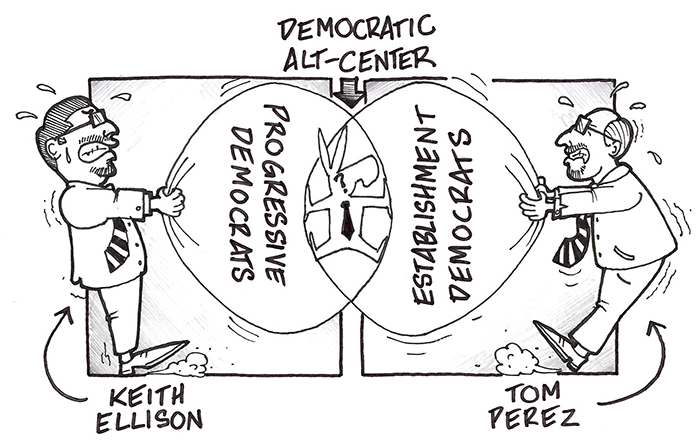DNC misses the mark with new chair
NICK SANDIFER | Evergreen cartoonist
The DNC tried to appease everyone, but ultimately failed to satisfy all democrats by appointing Chair Tom Perez and Deputy Chair Keith Ellison.
March 22, 2017
Embrace progressive politics
By Josh Maasberg
Democrats should be furious after the election of Tom Perez over Keith Ellison as the new Democratic National Committee (DNC) chairman.
This was an opportunity for the DNC to move in a new direction following the devastation of the Democratic Party over the last half decade, in which the party lost over a thousand federal and state-level offices.
The underlying reasons behind these sweeping losses are numerous and still widely debated, but one thing is clear — the Democratic Party needs to adapt.
The DNC organization is responsible for governing the structure, strategies and policy agenda of the Democratic Party. Its voting members, consisting of state party officers, local activists, donors and some elected officials, initially voted 213.5 to 200 (Democrats abroad count for half votes) in favor of Perez.
After fringe candidates conceded and the reins tightened for a recount, Perez was elected as the new chairman with a final vote of 235 to 200 in the first contested DNC chair election since 1985.
To progressive Democrats, Keith Ellison symbolizes the social-democratic reform movement Bernie Sanders embodied during his campaign.
The election of Perez, former labor secretary under the Obama administration, affirms the DNC’s unwillingness to embrace social-democratic reform and the blooming progressive movement within the party.
Brad Wilson, Washington State central Democratic committeeperson and DNC member who voted for Ellison, shared his thoughts on the election of Perez.
“I don’t think being a centrist is going to work,” Wilson said. “We didn’t see it work in the past presidential election, and I don’t think we’ll see it work moving forward.”
The former DNC chairwoman, Debbie Wasserman Schultz, resigned after news broke that she allegedly conspired with other party leaders to sabotage the Sanders campaign, even though he was polling better than Hillary Clinton against Donald Trump in several key states, according to The New York Times.
Her interim replacement, Donna Brazile, recently wrote an essay in Time to defend herself against similar allegations that she passed town hall questions to the Clinton campaign.
Instead of saving face, party leaders need to acknowledge the DNC’s strategic failure epitomized in Clinton’s brutal loss to Trump. They need to acknowledge this defeat by promoting a progressive agenda that puts fresh faces at the forefront of the Democratic Party.
Perez did announce Ellison as his deputy chair following the election, reportedly with desire to make Ellison the new face of the party. Both candidates also wore each other’s campaign pins during a joint press conference immediately following the election.
Nevertheless, Democrats should employ some healthy skepticism toward what many consider to be little more than feel-good theatrics intended to placate the DNC’s evolving voter base.
Eric Fejeran, chairman of the Whitman County Democrats, shared his optimistic perspective on the future of the Democratic Party.
“We’re moving to the left no matter what happens,” Fejeran said. “[The Democratic Party] is the longest lasting political party in the United States. It’s gone through many changes, and [the progressive movement] is going to be the next change.”
Come what may, almost half of the voting members of the DNC voted for Ellison, a clear mandate from a massive portion of the Democratic Party’s voter base to embrace a more progressive agenda.
Center politics for millennials
By Tyler Laferriere
As the political medians split between the right and left, the Democratic National Committee (DNC) chair election could have been a watershed moment for the political center. That opportunity was wasted on a standard-bearer of the Obama legacy.
This is not to totally dismiss the milestones of the previous administration, but Hillary Clinton’s attempt to run on the achievements of the Obama administration, and some seriously ill-advised email practices, cost the Democrats the election. Now the DNC has elected Tom Perez, Obama’s former labor secretary, to carry the democratic torch.
In a show of unity, Perez selected Keith Ellison, Minnesota congressman and long-time Bernie Sanders supporter, as deputy chair. The Obama legacy and Sanders insurgency that lost the 2016 election now intends to push the DNC into the future.
These choices demonstrate a lack of courage in the Democratic Party to champion new visions and forge new coalitions. Indeed, the new leadership roles of Perez and Ellison illustrate the unwillingness of the Democrats to recognize the ideas that led to the defeat of Clinton.
Some might argue the appointment of Ellison represents an olive branch to Sanders supporters after the revelations of DNC favoritism toward Clinton after the 2016 primaries. This logic then implies a continued Democrat belief that Sanders could have defeated Trump.
Sanders’ support for free college tuition signaled a disregard for the working poor and middle class voters for whom college is not a reality, writer Kurt Eichenwald wrote on Nov. 14 in Newsweek.
“Clinton was in the delicate position of dealing with a large portion of voters who treated Sanders more like the Messiah than just another candidate,” Eichenwald wrote.
The DNC did not recognize the opportunities presented by Pete Buttigieg, the young mayor of South Bend, Indiana. This Harvard-educated veteran has the youth and state-focused party vision to make the Democratic Party’s platform more realistic and palatable to many of the same constituencies lost or left behind in the 2016 campaign.
“The research is mixed on this, but there does seem to be an electoral disincentive to track to the middle when you’re in a safe GOP or safe Democrat district,” political science professor Travis Ridout said. “But that’s more of a House issue than a Senate or governor issue where the median voter theorem still holds.”
However, Perez and Ellison signal a continuing DNC focus on D.C., not the states, where Democrats control a minority of state houses and governorships. Though not as attractive as Sens. Al Franken or Elizabeth Warren railing against the president or cabinet in D.C., state politics matter, as the Republicans demonstrated in 2016.
Buttigieg would have begun to put millennials into real political power. Current champions of both parties are too old to defend the interests of millennials of all classes and races adequately. The South Bend mayor would have been the start of generational transition from the old to the young.
“My contention is if we’re saying we want to engage a new generation, bring in a leader from a new generation,” Buttigieg said in an interview with NPR. “If we’re saying we want to compete and win in red and purple states, find somebody who’s been competing and winning in as red a state as it gets, Mike Pence’s Indiana.”
Democrats – and Republicans – still do not recognize many of their partisans, and voters sit uncomfortably with the parties with which they affiliate. According to the Pew Research Center, only 38 percent of Republican-leaning independent voters view the GOP warmly and 45 percent of Democratic-leaning independent voters view that party warmly.
The DNC had the opportunity to push into a new political center, but squandered it.
Josh Maasberg is a sophomore political science major from Murrieta, California. He can be contacted at 335-2290 or by [email protected]. The opinions expressed in this column are not necessarily those of the staff of The Daily Evergreen or those of The Office of Student Media.
Tyler Laferriere is a graduate student pursuing his master’s in economics from Phoenix, Arizona. He can be contacted at 335-2290 or by [email protected]. The opinions expressed in this column are not necessarily those of the staff of The Daily Evergreen or those of The Office of Student Media.










